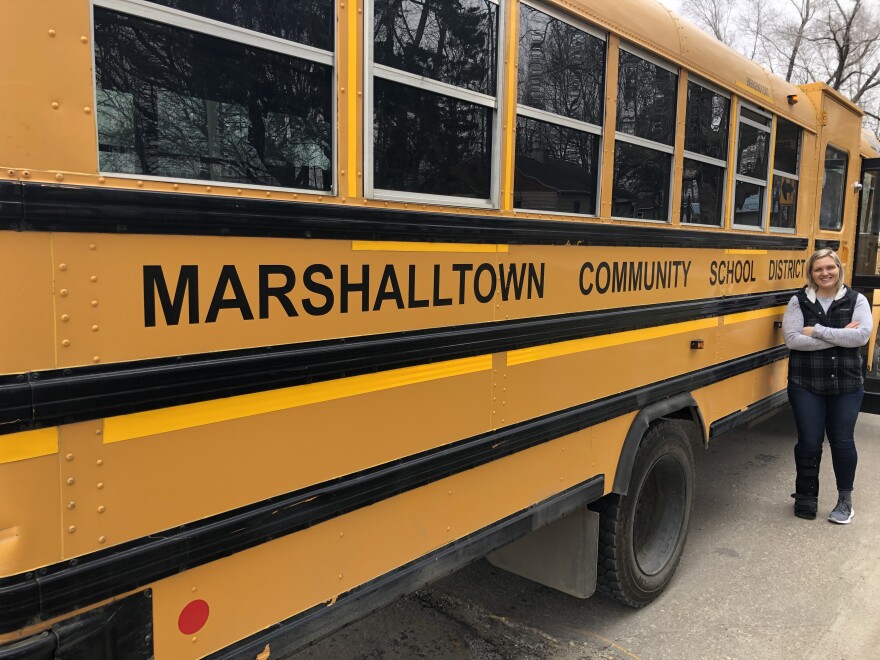A green school bus pulls up to an elementary school in Sioux City. It’s a quarter past noon. Kids and teens line up at the bus to get a sack with breakfast and lunch.
“There’s one and there’s two,” said a food service worker as she passed out bags. “Have a good day guys!”
Sioux City Community School District has a fleet of these colorful buses as well as mini buses and food service trucks. The vehicles pull up to schools or even mobile home parks, and hang around for up to an hour so kids ages 1 through 18 can come get food.

“We’re here to supply the need and obviously the need is there,” said Rich Luze, the food service director for the Sioux City School District. “It’s great that people are taking advantage of it so it makes it worthwhile doing it. It’s good to see that we’re making a difference.”
Iowa got a waiver from the U.S. Department of Agriculture to do a meal program similar to what it does during the summer. Normally with the USDA's Summer Food Service Program, kids and teens would stay on-site to eat. It encourages them to socialize. Now, things are a little different. With the spread of COVID-19 in Iowa, social distancing is now the norm, so kids get their meals and go home to eat them.
"They're only allowed to approach the bus, get a meal, and take it off-site to practice the social distancing," Luze said.
In some communities, school buses run routes through neighborhoods, making meal deliveries. In the central Iowa city of Marshalltown, a food service worker hands out meal bags from a bus. It’s Friday, so kids can get lunches and breakfasts to hold them over through Sunday.
Lynn Large, the food service director for the Marshalltown Community School District, said the school district had been tossing the idea of a mobile route around for a while for the summer meals program. But with schools closed because of COVID-19, now was a good time to try it. Large said families need security while schools are closed, and the buses give kids better access to food.

“A lot of our parents are still working and their children may not be able to walk far enough to get to a physical school location,” Large said. “So the buses help to bridge the gap between access for kids in their neighborhood.”
Lately, more kids have been using the bus delivery service, rather than going to a school to pick up food, Large said. Last Wednesday, the school district served 1,039 meals. Large said the buses served 616 meals and 423 meals were served at a school building.
“Every day we’ve done this, we’ve seen our participation increase a little bit,” Large said on the bus deliveries.
The buses spend about 7 minutes at each stop, before they take off to the next one. A typical route takes nearly 3 hours. Vans that make stops into the rural areas north and south of town spend about 2 hours on the road.
A lot of our parents are still working and their children may not be able to walk far enough to get to a physical school location. So the buses help to bridge the gap between access for kids in their neighborhood. -Lynn Large, Marshalltown Community School District
In rural southwest Iowa, staff with the Essex and Hamburg school districts are making home deliveries. Even the superintendent, Mike Wells, is pitching in. He video chatted with Iowa Public Radio last week as he made a delivery to two families in Riverton that belong to the Hamburg Community School District.
“Hi Dr. Wells!” said a boy who answered the door.
“I’ve got some food here for you!” Wells said enthusiastically. “I’ll let you take the top box? There you go, you take the big box!”
The home deliveries allow Wells to check in with families and see how they’re doing.
“Without going there and actually seeing, you wouldn’t know what people need,” Wells said.
Many in the area are still recovering from last year’s historic flooding from the Missouri River and its tributaries. On top of that, some parents were recently laid off from their jobs because of the novel coronavirus.
“They’re at home, they do not have money, their food supplies are limited,” Wells said, “so that’s the reality for them.”
So a quick visit helps, and Wells said it’s nice for him to see the kids’ smiles.
Besides food, Wells has also been delivering Wi-Fi hotspots to families that don’t have internet. That way kids can do online learning while they’re away from school. They can feed their minds while they’re feeding their bodies.





